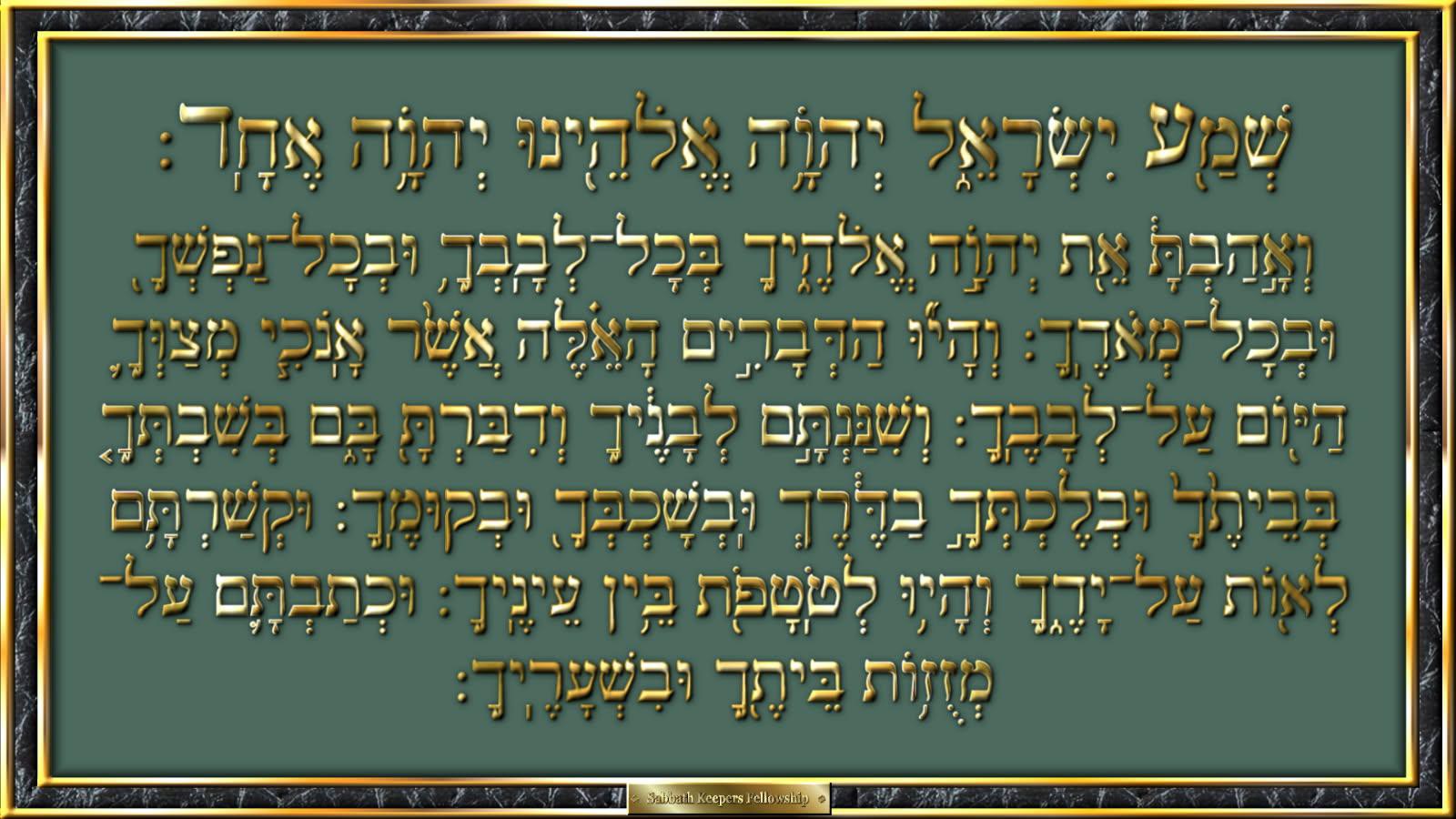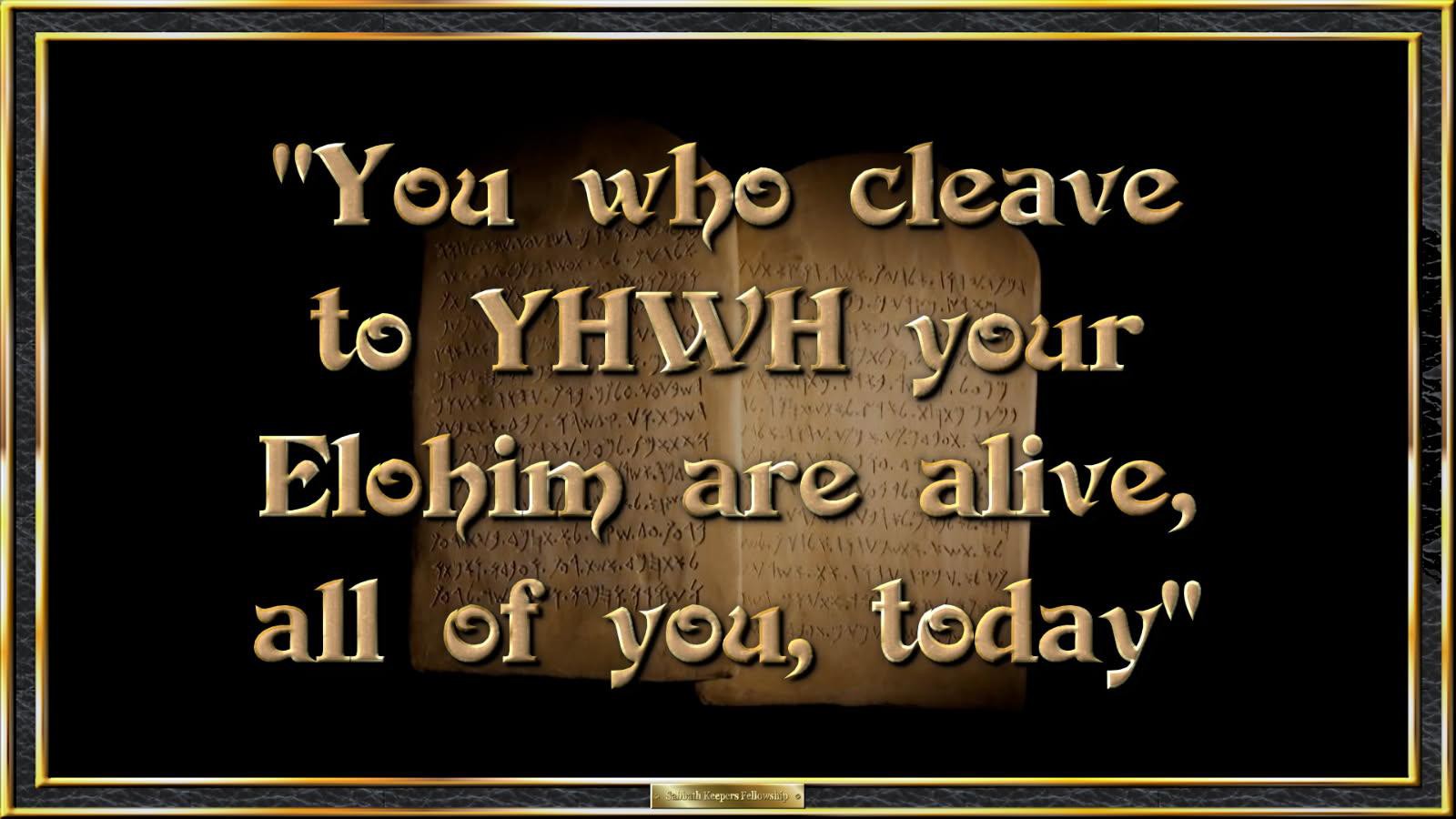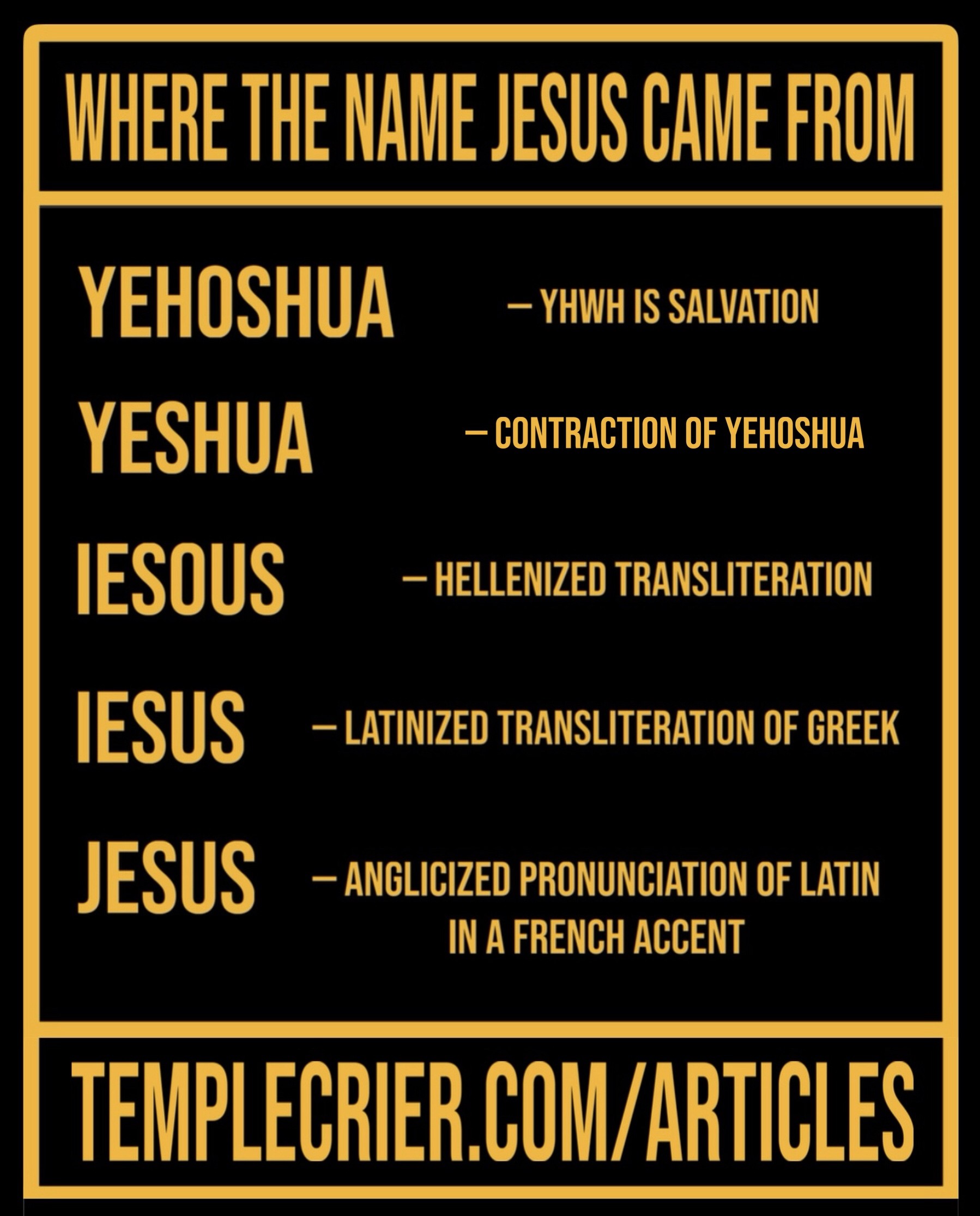Watch
Events
Articles
Market
More
Shalom, friends,
We invite you to join us live on YouTube at 3:30pm Central Time on this Sabbath afternoon, 08/09/2025, for scripture study and prayers.
The lesson for the day is titled:
"Chapter 6 - Ivrym (A Concise Commentary on the Book of Hebrews)"
Join us on YouTube at:
Many of our articles can be found in the library page of our website at:
Get our latest updates on our YouTube channel at:



FROM THIS WEEK’S TORAH PORTION – VA’ETHCHANAN:
Sh’ma Yisrael: YHWH Eloheynu. YHWH echad!
V’ahav’tha eith YHWH Eloheyka, b’kal-l’vav’ka, uv’kal-naf’sh’ka, uv’kal-m’odeka.
V’hayu, had’varym, haeleh, asher anoky m’tzav’ka hayom, al-l’vavka.
V’shinan’tam l’vaneyka, v’dibar’ta bam b’shiv’t’ka b’veytheka, uv’lekt’ka vaderek, uv’shak’b’ka, uv’qumeka.
Uq’shar’tam l’oth al-yadeka, v’hayu l’totafoth beyn eyneyka.
Uk’thav’tam al-m’zuzoth beytheka uvish’areyka.
Hear, O Yisra’el: YHWH is our Elohim. YHWH is one!
And you shall love YHWH your Elohim with all your heart, and with all your being, and with all your might.
And shall be, the Words, these, which I am commanding you today, upon your heart,
and you shall teach them to your children, and shall speak of them when you sit in your house, and when you walk by the way, and when you lie down, and when you rise up,
and shall bind them as a sign on your hand, and they shall be as frontlets between your eyes.
And you shall write them on the doorposts of your house and on your gates.




FROM THIS WEEK’S TORAH PORTION – VA’ETHCHANAN:
In writing about Va’ethchanan, a Torah portion which contains a recap of the Ten Commandments and the Sinai revelation, the Shema statement of Elohim’s oneness, Moshe’s plea to YHWH to enter into the land of Kana’an, any number of warnings against the dangers of idolatry, and no fewer soaring statements of faith in YHWH and His love for us, it is hard to decide upon what to focus. But the unambiguous statement, “But you who cleave to YHWH your Elohim are alive, all of you, today” touches upon all the above expressions of our unbreakable bond with YHWH our Elohim, who is One.
Moshe tells the people “But you who cleave to YHWH your Elohim are alive, all of you, today” in the context of his recounting of Israel’s horrific lapse into the idolatrous worship of the Moabite deity of Ba’al Peor, following the prophetic praises of Bila’am. Those who bowed down before Peor were all killed, and those who kept faith with YHWH were spared. But this simple statement of fact broadcasts an unmistakably universal message, especially when we hear the closing words, “all of you, today.” Moshe is talking to us. We are all alive today by virtue of our attachment to YHWH, our faith in the One Elohim, and our love for our Creator. YHWH is our breath and our heartbeat. People who have distanced themselves from YHWH, or have cut their ties to Him, are alive, but not fully so. We live and breathe but our lives are not lived to their fullest in the absence of a living relationship with Elohim. We need to keep in touch! How we conduct our conversation with YHWH is our private business, and our relationship with Elohim, if it is truly a living relationship, will change and grow each day, sometimes colder and sometimes warmer, depending on what is happening around us and how we see YHWH in our day to day lives. Sometimes we will feel like we are so close to YHWH we are practically touching His hand and sometimes we will feel that Elohim is further away than ever. To “cleave to YHWH” is not static and we don’t only cleave to Him in excellent times, but in bad times as well. We cleave to YHWH by asking Him questions whose answers we will never fully understand, and we cleave to YHWH by seeing the sublime beauty of a sunset and knowing that His hand crafted our world.
The danger of idolatry is not that we attach ourselves to meaningless things and misplace our faith in vanities. The danger of idolatry is that we disconnect ourselves from YHWH our source of life and squander our faith in the work of our own hands and the misguided musings of our own imaginations.
“Beware, lest you forget the covenant of YHWH your Elohim, which He made with you, and make for yourselves a graven image, the likeness of anything, which YHWH your Elohim has forbidden you. For YHWH your Elohim is a consuming fire, a zealous Elohim.” When we drift so far from YHWH that we turn to idolatry, whether it be the deities of the market-place, or the deities of social media, or whatever deities are in fashion, it does not go unnoticed. Elohim has no tolerance for those who actively and wittingly choose to cut their ties to Him. But Elohim, being Elohim, is always right here, ready to receive all who desire to rekindle their relationship.
When Elohim first formed woman from man, He decreed that a man shall “cleave to his wife, and they shall become one flesh,” employing the same word – to cleave – used by Moshe in his confirmation that “you who cleave to YHWH your Elohim are alive, all of you, today.” The word “cleave,” in Hebrew, is “dabaq,” which means: cling to, stay close, cleave to, follow closely, join with, overtake, catch, be joined together. We need to cleave to one another no less than we need cleave to YHWH, and to truly love another is to love YHWH, for He is our common denominator. YHWH and the life He blessed us with is what we humans share. To cleave to one another is to cleave to YHWH – to be alive.
“It is not right that man is alone” Elohim determined and set out to fashion for man a helpmeet, a significant other, so that we can truly live. Cleaving to one another is a gateway toward cleaving to YHWH. The pursuit of idolatry, in all its forms, ancient, as well as contemporary, is the path to loneliness. We cut ourselves off, not just from Elohim, but from our fellow man, and, ultimately, from ourselves. Pursuing Elohim’s wish that we not be alone brings Him into our lives. When we connect to one another Elohim’s Oneness becomes clear, His nearness becomes palpable.
The Shema, which the greatest of all commandments and is our creed says, “Hear, O Israel: YHWH is our Elohim, YHWH is One. And you shall love YHWH, your Elohim, with all your heart and with all your soul, and with all your might.” This is how we live! This is how we stay alive! Cleaving to YHWH is not merely a way of life. It is life, itself!




It really is just this simple. The name “Jesus” isn’t the Savior’s real Name like modern Christians claim and ‘Jesus’ doesn’t really mean ‘Hail Zeus’ or ‘Earth Pig’ or another of the other absurd accusations of the Messy-anics.
“Jesus” is simply the end result of watering-down the real Name and filtering it through several other languages and cultural shifts till english culture offered the latest version to the world by the British Empire.
It’s not necessarily evil to call Him “Jesus” but its much more like calling someone name d William by the name “Bill” or even moreso, calling someone name “John” by the name “Jack”.
The real evil is in the human need to hold fast to man-made tradition against the truth, to hate change, and to constantly view our Master in our image and through our culture.
The evil is in deifying the work of our hands. We as humans have made Yeshua the Messiah into Jesus Christ. We as humans have declared that this made up name is His Real One. And we as humans have declared the made up things to be true and even to be original…but worst of all to be sacred.
There is no evil in calling our savior by the nickname of Jesus, but there is a great evil in saying that Jesus is his real name. And there is a far greater evil in sanctifying the name we made up ourselves. 
#questioneverything
#getbiblical
https://templecrier.com/calvarian-articles-
https://storage.googleapis.com..../production-ipage-v1




Thought for Today: Tuesday August 05
Grace means “undeserved favour or goodness”. Elohiym does not owe us anything --- yet, in His grace, He still gives us good things. We do not even deserve the next breath we take, but He, in His grace grants it. Most of all, we do not deserve to go to heaven, but in His grace, YHVH has provided a way – He sent Yeshua Moshiach to pay for our sins. We never like to admit this but we are sinners. Many think that they are not “bad” after all, and YHVH should overlook our sins – That is not true at all!



Let's unpack the deep layers psychologically, spiritually, and communally of what can happen when fear turns fatal, when beliefs (or theories) shared online intersects with personal despair 🙁
https://afflicted4messiah.word....press.com/2025/08/04


